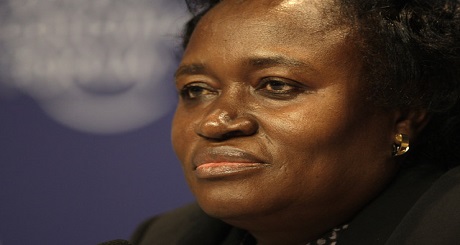E-Financial
Nigeria to Miss MM Cross Border Remittance Deal

Nigeria will not be a beneficiary of the landmark deal struck by major telecom operators in Africa for the implementation of interoperable mobile money services across Africa and the Middle East regions because no telco in the country is licensed to provide mobile money services, Nigeria CommunicationsWeek has learnt.
Global System for Mobile Association (GSMA) an umbrella body of mobile networks had announced that nine mobile network operators, including Bharti Airtel, Etisalat Group, Millicom, MTN Group, Ooredoo Group, Orange, STC Group, Vodafone Group and Zain Group, have committed to work together to accelerate the implementation of interoperable mobile money services across Africa and the Middle East regions.
But this is of no economic importance to telecommunications companies in Nigeria because none have license to operate mobile banking services.
Nigeria operates a bank-led mobile banking model where a bank deploys mobile payment applications or devices to customers and ensures merchants have the required point-of-sale (PoS) acceptance capability.
Mobile network operator are used as a simple carrier, they bring their experience to provide Quality of service (QoS) assurance.
Commenting on the development, Emmanuel Okoegwale, principal associate, Mobilemoney Africa, said that for the African continent as a whole, this is a positive development which will be felt quickly with cross border remittances products and services.
“GSMA as we know is largely focused on Mobile network operators so there might be a challenge with other players outside of this industry however the agreement will provide a basis for fresh and new initiatives at country level to drive interoperability. As good as it may be, some operators may not fancy it since it will disrupt their own existence and positioning, that is why continental mobile money poster child, MPESA cannot be found in the scheme list at least for now. This will replicate at different country level also. Dominant providers may opt-out where they have the advantage of a large market share.”
Okoegwale told Nigeria CommunicationsWeek that : “where the MNOs operate, it will accelerate adoption, improve access and reach of agency network, merchant point acceptability for mobile money, reduce cost of cross border remittances especially within African Nations.
At different country level, it will help regulators and providers understand why and how they need to work together to achieve inter-operaibility. In places like Nigeria where the inter operability discussion is already on, this agreement may provide some insights on achieving better outcomes”. He added
Overall, the agreement is a welcome development for Africa as a whole but it will still need to conform with different national regulations and applicable laws.
The GSMA’s Mobile Money Interoperability (MMI) programme is a global programme which also includes mobile network operators from other regions and focuses on helping them to successfully launch and scale interoperable mobile money services through identifying and sharing best practices, guidelines and processes, creating performance benchmarks, and providing regulatory support. Collectively, these operators account for 582 million mobile connections across 48 countries in Africa and the Middle East.
Central Bank of Nigeria provides interoperability infrastructure and service through National Central Switch operated by Nigeria Inter-Bank Settlement Scheme (NIBSS). This service is restricted to mobile money transactions among 16 licensed operators as well as banks and within the country.
E-Financial
NBS Reports ₦6.72 Trillion VAT Haul as Tax Reforms Pay Off

Nigeria’s Value Added Tax (VAT) revenue surged to ₦6.72 trillion in 2024, marking an 84.6% increase from ₦3.64 trillion in 2023, according to the National Bureau of Statistics (NBS). This sharp rise reflects stronger economic activity and improved tax collection efforts across key sectors.

VAT revenue showed consistent growth throughout the year. In Q1 2024, collections stood at ₦1.43 trillion. This rose to ₦1.56 trillion in Q2, representing a 9.09% increase. Q3 recorded ₦1.78 trillion, up 14% from the previous quarter, while Q4 peaked at ₦1.95 trillion, a 9.5% rise from Q3.
In Q4 alone, VAT collections totaled ₦1.95 trillion, with domestic VAT payments contributing ₦917.40 billion, non-import foreign VAT at ₦554.68 billion, and import VAT at ₦474.75 billion. Domestic VAT remained the largest source, indicating strong local business activity and consumer spending.
Several sectors posted significant quarter-on-quarter growth in Q4. Extraterritorial organisations and bodies saw a dramatic rise of 180.05%, followed by agriculture, forestry and fishing at 70.83%, and human health and social work at 46.13%. These gains suggest increased operational scope, improved compliance, and possibly targeted government incentives.
However, not all sectors fared well. Households as employers and self-use production contracted by 28.97%, while the information and communication sector declined by 23%. The drop in ICT may reflect shifting market dynamics or regulatory headwinds affecting digital services.
Overall, the surge in VAT revenue signals a positive fiscal outlook for Nigeria, with implications for budgetary planning, infrastructure investment, and social services funding. It also highlights the importance of sector-specific monitoring to sustain momentum and address emerging challenges.
E-Financial
FIRS Unveils e-Invoicing, Electronic Fiscal System for Large Taxpayers

Federal Inland Revenue Service (FIRS) has commenced an electronic invoicing solution (e-invoicing) aimed at transforming digital tax administration and revolutionising tax payment in Nigeria.

The e-invoicing system, also known as the Merchant-Buyer Model, is designed to make tax compliance easier, faster and more transparent for all categories of taxpayers.
A statement by Dare Adekanmbi, special adviser on Media to Zacch Adedeji, chairman, FIRS, said the solution went live on August 1, following a successful pilot phase which began in November 2024.
According to the statement, large taxpayers, which are companies with annual turnover of N5 billion and above, are the first to be onboarded. In less than two weeks after the initiative went live, no fewer than 1,000 companies, representing 20 per cent of over 5,000 eligible firms, have embraced the solution and commenced integration with the FIRS MBS platform.
It noted that the remaining large taxpayers are expected to come onboard on or before November 1, the deadline for all firms in the category to complete their onboarding and integration processes.
“MTN Nigeria became the first taxpayer to transmit live electronic invoices to the FIRS, officially ushering in the e-invoicing regime. Huawei Nigeria and IHS Nigeria have also concluded test transmissions and are set to go live in the coming days.
“In collaboration with the National Information Technology Development Agency (NITDA), Service Providers have been incorporated into the ecosystem to act as both System Integrators and Access Point Providers. These providers will facilitate the onboarding, integration, and invoice transmission processes for taxpayers.”
The statement commended all large taxpayers, tax consultants, and service providers for their cooperation and commitment to the success of the project.
“We also acknowledge the genuine efforts of many taxpayers who strove to meet the 1st of August 2025 deadline but encountered operational constraints.
“In the spirit of encouraging voluntary compliance, the FIRS management has graciously approved a three-month extension of the deadline, with the new deadline now set for 1st November 2025.
“The FIRS e-Invoicing Implementation Team will continue to provide support through stakeholder engagements, including webinars, workshops, and town hall meetings, to ensure a seamless transition for all large taxpayers,” it added.
The national e-invoicing solution is an electronic fiscal system (EFS) developed by FIRS to provide real-time visibility into commercial transactions and ensure the authenticity, accuracy and completeness of invoices.
It is being implemented in phases, starting with large taxpayers, with medium and emerging groups to follow.
The initiative aligns with global best practices and supports the Federal Government’s broader objectives of enhancing revenue assurance, reducing tax evasion, and modernising tax administration.
It is also a critical tool in the implementation of the Nigeria Revenue Services Reform Act, which seeks to harmonise revenue reporting and establish a single source of truth for government revenues.
E-Financial
First Securities Secures Remarkable Position in NGX Performance Report

First Securities Brokers Limited, the stockbroking subsidiary of First Holdco Plc, recently announced its impressive performance in the latest Nigerian Exchange (NGX) Broker Performance Report. The firm secured first place in terms of trading volume and value of transactions for the month of July, 2025.

According to the report, First Securities Brokers Limited displayed strong trading activity and strategic market positioning, further solidifying its reputation as a significant player in the capital and equities market.
Fiona Ahimie, Chief Executive Officer and Managing Director of First Securities Brokers Limited expressed her pleasure at the firm’s achievement of a trading value of ₦414.457 billion, which accounts for 22.80% of the total trading value reported by the NGX during the review period. This performance highlights the effectiveness of the integrated model promoted by First Holdco Plc.
The Holding Company’s strategic focus on synergy within the Group played a crucial role in enhancing the performance of First Securities Brokers Limited.
“This remarkable achievement reflects the hard work and dedication of our entire workforce, as well as the trust our clients continue to place in us. It underscores our growing influence and effectiveness in the Nigerian equities market,” she added.
“Our focus on providing innovative and seamless trading solutions, coupled with deep market expertise, has been crucial to driving this success. We are not just a brokerage firm; we are strategic partners in our clients’ financial journeys. This recognition further motivates us to deliver exceptional value.”
“We remain committed to creating long-term value for our clients and stakeholders. Building on this momentum, we will continue to enhance our service offerings and further establish our position as a key driver of growth and development in the Nigerian financial market.”

 News2 days ago
News2 days agoGoogle Hit by AI-driven Cyber Attack

 General News2 days ago
General News2 days agoKuwait Busts Nigerian Cybercrime Ring Targeting Telecom Tower, Banks

 E-Business2 days ago
E-Business2 days agoZequence Digital Boss Calls for Strong IP Laws Enforcement, to Protect Nigeria’s Software Sector

 News2 days ago
News2 days agoFIRS Rolls out e-invoicing System for Large Corporate Taxpayers

 Telecom2 days ago
Telecom2 days agoMTN Nigeria’s Mega Billion Promo Turns Airtime into Fortune for Thousands Amid Economic Strain

 Telecom2 days ago
Telecom2 days agoT2 Commits to Innovation, Resilience as Customer-centric Ethos Form New Focus

 Telecom2 days ago
Telecom2 days agoI see Crisis, Resignations @ MTN, Airtel, Others – Primate Ayodele

 E-Business2 days ago
E-Business2 days agoPalmPay Partners AXA Mansard Health to Make Digital Insurance Accessible, Affordable























